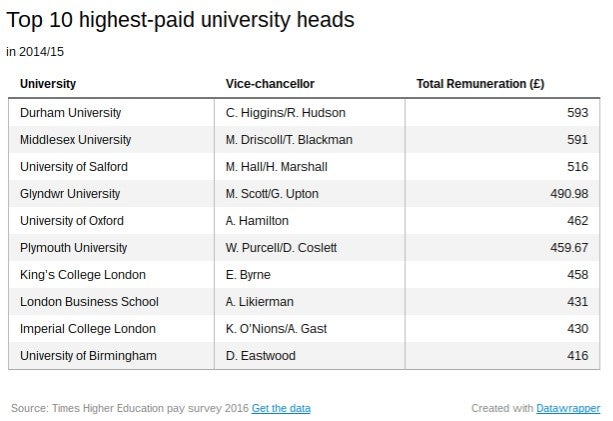Your support helps us to tell the story
From reproductive rights to climate change to Big Tech, The Independent is on the ground when the story is developing. Whether it's investigating the financials of Elon Musk's pro-Trump PAC or producing our latest documentary, 'The A Word', which shines a light on the American women fighting for reproductive rights, we know how important it is to parse out the facts from the messaging.
At such a critical moment in US history, we need reporters on the ground. Your donation allows us to keep sending journalists to speak to both sides of the story.
The Independent is trusted by Americans across the entire political spectrum. And unlike many other quality news outlets, we choose not to lock Americans out of our reporting and analysis with paywalls. We believe quality journalism should be available to everyone, paid for by those who can afford it.
Your support makes all the difference.UK universities have been accused of of “blatant double standards” on the day it is revealed that vice-chancellors’ pay has risen around four times faster than pay for most academic staff.
The comments have been made by the general secretary of the University and College Union (UCU), Sally Hunt, after Times Higher Education’s (THE) 2016 pay survey shows Anne Carlisle, head of Falmouth University - one of Britain’s smallest - received a pay rise of almost £60,000 last year, despite the institution only having around 4,200 students.
Her pay rise now puts her on par with the heads of other larger and more prestigious universities like Manchester and, in some cases, is more.
Carlisle’s earnings, for example, at £285,900, have emerged to be more than those of Sir Timothy O’Shea, head of the University of Edinburgh. With around 35,500 students, his pay is £271,000.
A Falmouth spokesman told THE that Carlisle’s remuneration was a “reflection of the continued growth and success of the university,” whose student numbers have grown by 30 per cent in the past two years.
On the whole, the survey, which was carried out for THE by accountants Grant Thornton, showed the average salary and benefits package paid to vice-chancellors rose by £14,595 to £252,745 over the past academic year, a rise of just over six per cent.

Hunt called the disparity “a disgrace,” and said: “Despite clear calls from Government for pay restraint at the top, vice-chancellors have enjoyed bumper pay rises of over four per cent, on average, while increases for rank-and-file staff are held down at barely a quarter of that.
“Average pay increases should match those enjoyed by vice-chancellors but, instead, the majority of academic staff have seen the value of their pay fall by 14.5 per cent in six years, while job insecurity is rife and there has been little progress on the gender pay gap.”
Hunt added that universities “need to answer some hard questions” about how they will continue to attract and retain the best talent when pay is being held down and hardworking staff are “receiving such poor reward for their efforts.”
The findings from the survey have come in the same week the Government’s higher education White Paper laid out plans for universities which score highly for teaching quality to further raise their tuition fees above £9,000 per year.
The general secretary’s remarks have come just days before university staff from across the country prepare to go on a two-day national strike over the 1.1 per cent pay rise offered by the employer body, the Universities and Colleges Employer Association (UCEA).
UCU had said this was less than universities could afford to pay and that staff pay increases should match those enjoyed by vice-chancellors.
In a statement on Friday, though, UCEA described how it met with higher education trade unions on Thursday for a second dispute resolution procedure meeting in the HE pay negotiations for 2016/17. UCEA said it provided “extensive details of all aspects of [a] fair and final offer.”
The UCEA has also explained that THE’s survey looks at the last academic year’s pay which is what the pay offer that next week’s UCU strike is over. In a statement, a UCEA spokesperson said comparisons of the heads’ average pay increases to the pay increases for others require an accurate assessment of the progression and merit pay increases that sit on top of the base-line increase for non-senior staff.
The spokesperson said: “We know the average increase received by staff in 2014/15 was 3.5 per cent. For the same year, Hesa data confirms the comparable increase in mean basic pay for all heads to be a similar figure at 3.3 per cent.
“It is positive to see the year-on-year trend of like-for-like ratios continue when it comes to head and staff pay uplifts. It is clear the ‘cost of the office’ of a head of institution post - rather than actual pay increases received by individuals - as comparable with other HE staff pay uplifts is misleading.”

Join our commenting forum
Join thought-provoking conversations, follow other Independent readers and see their replies
Comments